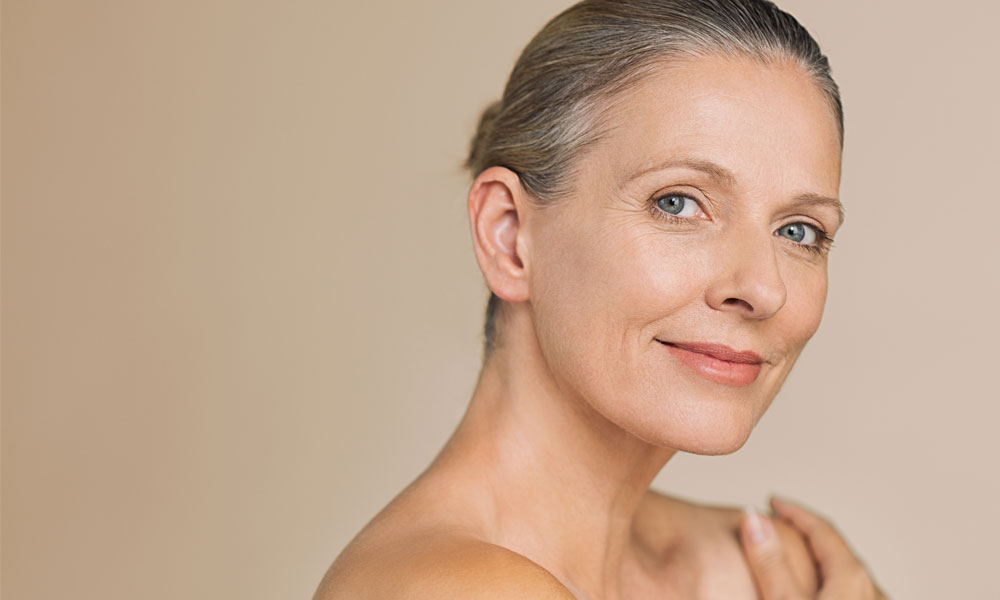Menopause is a significant phase in a woman’s life, marked by various physiological changes due to fluctuating hormone levels.
One of the most noticeable changes occurs in the skin. Understanding how menopause affects the skin and exploring ways to combat these effects with treatments from our nurse-led skin clinic in Buckingham can help maintain a healthier appearance.
Loss of Collagen
Collagen is a crucial protein that maintains the skin’s elasticity and firmness. During menopause, the decline in oestrogen levels leads to a significant reduction in collagen production. This results in the skin becoming thinner, less elastic, and more prone to wrinkles and sagging.
Dryness and Dehydration
Hormonal changes during menopause often cause the skin to become dehydrated. Again, the decrease in oestrogen affects the skin’s ability to retain moisture, leading to a rough texture and increased sensitivity. This dryness can exacerbate the appearance of fine lines and wrinkles.
Changes in Skin Texture
Menopause can also lead to changes in skin texture, making it either more oily or excessively dry. Reductions in oestrogen and progesterone levels disrupt the balance of sebum production, causing some women to experience oily skin and others to suffer from extreme dryness.
Hormonal fluctuations during menopause may also trigger breakouts and acne. The imbalance in hormone levels leads to an increase in androgen levels, stimulating the sebaceous glands and resulting in clogged pores and acne outbreaks.
Combating Menopausal Skin Changes with Aesthetic Treatments
To address the loss of collagen, the skin specialist nurse clinic offer various treatments designed to stimulate collagen production and improve skin elasticity.
Microneedling
Microneedling involves creating tiny punctures in the skin using fine needles. This process stimulates the body’s natural healing response, promoting collagen and elastin production. It can also help reduce the appearance of wrinkles and improve skin texture. At the skin specialist we use the renowned SkinPen precision device to deliver both safe and effective treatments.
Hydration and Moisturising Treatments
To combat dryness and dehydration, the skin specialist nurse clinic offers a range of medi-facials; specialised treatments that replenish moisture and restore the skin’s natural barrier.
Injectable Moisturisers
Injectable treatments, such as hyaluronic acid fillers, can also provide long-lasting hydration and volume to help address volume loss. Skin boosters such as Profhilo and Juvederm volite focus on improving the skin condition and helping to retain moisture in the skin, making it appear plumper and more youthful.
Managing Oily Skin and Breakouts
For those experiencing oily skin during menopause, the skin specialist nurse clinics offer Obagi skin care and treatments to regulate sebum production and help acne such as our signature obagi blue radiance skin peel or our acne express facial.
Chemical Peels
Chemical peels involve applying a solution to the skin that exfoliates the top layers, removing dead skin cells and unclogging pores. This treatment can reduce oiliness, improve skin texture, and diminish acne scars.
LED Light Therapy
LED light therapy uses specific wavelengths of light to target and reduce acne-causing bacteria. It also helps to calm inflammation and promote healing, making it an effective treatment for managing breakouts.
Personalised Skincare Regimens
In addition to professional treatments, the skin specialist nurse offers a thorough initial skin consultation and assessment to help develop a personalised skincare regimen tailored to your specific needs. This regimen may include products that contain ingredients like retinoids, peptides, and antioxidants, which can help address the various skin changes associated with menopause.
To discuss a skin concern with our specialist nurse, book a consultation with us to find out more.

